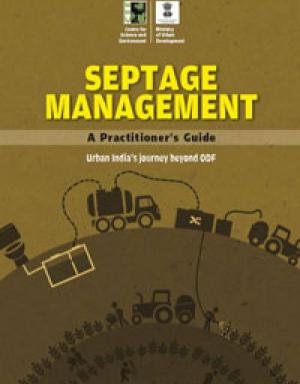Training cum Exposure Visit: Experience and knowledge sharing in Faecal Sludge and Septage Management
Date: February 08-13, 2020
‘A forum for knowledge sharing in global south’
Centre for Science and Environment (CSE) in collaboration with WaterAid Bangladesh is organizing a 5-day Training cum Exposure Visit for ‘Experience and knowledge sharing in Faecal Sludge and Septage Management (FSSM)’ from 8-13February 2020.
Bangladesh has made significant strides in reducing the practice of open defecation in the country. Since majority of the households are dependent upon onsite sanitation systems, Bangladesh Government has introduced the Institutional and Regulatory Framework (IRF) for FSSM to recognise ways and means of implementing FSSM services and to outline specific roles and responsibilities of various institutions and stakeholders. WaterAid Bangladesh is supporting the cities of Shakhipur and Saidpur in demonstrating sustainable FSSM. These treatments plants employ nature-based technology for treatment of Faecal Sludge and Septage and employ co-composting of organic municipal solid waste with dried FSS to improve the quality of the final compost.
India was declared open defecation free on 2nd October 2019 with more than 100 million toilets constructed. It has a National Faecal Sludge and Septage Man agement Policy. Many states including Uttar Pradesh has issued state specific policies. There are more than 400 FSTPs being planned in the country with 31 FSTPs under tendering in the state of Uttar Pradesh. Taking cognisance of the impact of discharging untreated FSS on the pollution in river, the National Mission for Clean Ganga has piloted an FSTP in the city of Chunarwhich is being supported by CSE.
Both India and Bangladesh have similar challenges relating to scaling-up pilot initiatives for mainstreaming citywide sanitation.The training intends to bring practitioners and officials from India and Bangladesh together to develop a platform for knowledge sharing and create opportunities for networking and foster development of long term partnerships. The training will focus on best practices in technology and managementof faecal sludge and would include visit to operational Faecal Sludge Treatment Plants undertaking co-composting as well as interactive sessions with representatives from local bodies as well as agencies involved in the FSSM interventions.
Learning Objective
- To get acquainted with issues and challenges relating to planning and implementing Faecal Sludge and Septage Management in a city.
- Planning and designingof co composting of dried faecal sludge with organic municipal solid waste.
- To understand various examples of resource recovery from reuse of bio-solids from Faecal Sludge Treatment.
- Peer to peer learning through experience sharing on implementing FSM in cities by officials/practitioners from both the countries.
Target Audience
The training would target officials and practitioners involved in operationalizing of Faecal Sludge and Septage Management:
- Municipal Engineers and Engineers working in Govt. implementation agencies
- Consultants and advisors working with Govt. Departments.
- PSU / TSU officials supporting state / cities implementing FSSM
(Participation by invitation only)
Tentative Itinerary (TBC)
7th Feb: Arrival in Delhi
8th Feb: Departure to Dhaka
9th & 10th Feb: Classroom Sessions on FSSM
11th & 12th Feb: Field Visit and Knowledge sharing sessions
13th/14th Feb: Departure to Delhi
For more information:
|
Training Coordinators |
|
|
Rahul Mankotia (CSE) |
Mohammad Golam Muktadir |
|
Training Directors |
|
|
Dr Suresh Kumar Rohilla |
Dr Abdullah Al Muyeed |
Flyer |
|
 |
|
About Trainers and Facilitators |
|
 |
 |
| Dr. Md Khairul Islam Regional Director, WaterAid, Bangladesh |
Hasin Jahan Country Director WaterAid Bangladesh |
 |
 |
| Dr Abdullah Al Muyeed Head of Policy & Advocacy, WaterAid, Bangladesh |
Suman Kanti Nath Project Manager, WaterAid, Bangladesh |
 |
 |
| Dr. Suresh Kumar Rohilla Senior Director CSE |
Bhitush Luthra Programme Manager, CSE |
 |
|
| Rahul Mankotia Programme Manager, CSE |
|
Alumni Feedback |
|
| ‘Good knowledge of the subject and lectures were good. They have command on the subject. Site visit was good and sites were well maintained.’ Surendra Bahadur Singh, SDM (Mirzapur |
|
| It was a very good experience to visit plants at Bhubaneswar and Puri. This visit has enhanced understanding on FSSM and FSTP.’ Mohit Chak, Executive Engineer, UP Jal Nigam |
|
Projects worked on by the Trainers |
|
Reports |
|
 Septage Management - Urban India's journey beyond ODF Septage Management - Urban India's journey beyond ODF |
|
 Managing Septage in Cities of Uttar Pradesh Managing Septage in Cities of Uttar Pradesh |
|
 Mainstreaming Co-Treatment of Faecal Sludge & Septage (FSS) in Stps in Uttar Pradesh Mainstreaming Co-Treatment of Faecal Sludge & Septage (FSS) in Stps in Uttar Pradesh |
|
Share this article